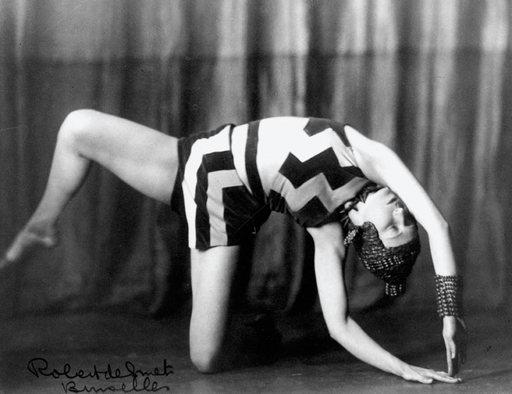
Akarova, Allegro Barbaro, 1929, Archives d’Architecture Moderne, Bruksela.
On 3-4 December 2016, Muzeum Sztuki ms? in Łódź (ul. Ogrodowa 19) will host the International Research Conference How Does the Body Think? Corporeal and Movement Based Practices of Modernism and Modernity, organised as an accompanying event to the Moved Bodies. Choreographies of Modernit exhibition presented at Muzeum Sztuki ms?. The Conference will discuss kinetic and kinaesthetic practices of Modernism and Modernity in art as well as in theory. Movement became the synonym of progress and accumulation characterizing many aspects of life in late 19th and 1st half 20th century. Our main area of interest includes dance and choreography seen in a wider context of corporeal and movement-based practices, which, on the one hand, freed the body from a straitjacket and conventions and, on the other, helped to prepare it for more productive labour. In the age of dynamic industrial development labour performed by a dancing body was the filed for experiments parallel with those in (Fordist) economics. How does modern bodies and their movement reflect new approach towards the economy of gesture, effort, energy, division and organisation of labour? What new visions of a moving body does Modernism proposed? Can we state that choreographic tools available to artists abstracted the corporeality of a dancing body by composing it in more formal and less mimetic way thereby making dance an autonomous art?
The Conference is organised within the framework of the exhibition, for which the question of corporeal and kinaesthetic aspects of Katarzyna Kobro?s (1898 -1951) theory and practice provides a starting point. The exhibition focuses on the problem of movement rationalisation and functionalisation in artistic practices of Modernism ad Modernity. Rationalisation and functionalisation understood as laboratory analysis of the sequencing movement and gesture, an examination of their anatomic conditions, a scrupulous record, design of space dynamics that dictates purposeful and precise movement, as an investigation of the mathematics and rhythm of body movements in space and finally an expansion of the potentiality of movement for the needs of progress. The main question posed by the exhibition concerns the affective consequences of the optimal psycho-physical coordination of human actions leading to rational and purposeful social behaviour.
Participants: Inge Baxmann, Kate Elswit, Mark Franko, Julia Hoczyk, Gaja Karolczak, Wojciech Klimczyk, Anna Królica, Susan Manning, Felicia McCarren, Hanna Raszewska, Joanna Szymajda
Curators: Prof. Małgorzata Leyko, Katarzyna Słoboda
In collaboration with the Department of Drama and Theatre of the Faculty of Philology of the University of Lodz
SATURDAY, 3 December
ms?, 19 Ogrodowa Street, Łódź, Poland
10-10:30 am
Małgorzata Leyko, Katarzyna Słoboda
Introduction
10:30-11 am
Susan Manning
Nation and World in Modern Dance
11-11:30 am
Hanna Raszewska
Interwar Warsaw as an European power of modernistic dance?
11:30 am-12:00 tea/coffe break, Slavic gymnatics excercises
12:00-12:30 pm
Mark Franko
Labor, Abstraction, and the Real Thing
12:30-1 pm
Kate Elswit
Watching Modernist Dance, Watching Modernist Bodies
1-2 pm lunch break, Slavic gymnastic excercises
2-2:30 pm
Inge Baxmann
The technical and the organic : dance and technologies of life in Weimar Avantgarde Art and Culture
2:30-3 pm
Wojciech Klimczyk
Ambivalent power of (modern) rhythms: Jaques-Dalcroze, Fuchs, Nijinsky
3-5 pm ? discusion, Slavic gymnastics excercises
SUNDAY, 4 December
ms?, 19 Ogrodowa Street, Łódź, Poland
11-11:30 am
Felicia McCarren
Dancing Machines: choreographies of the age of mechanical reproduction
11:30 am -12:00
Anna Królica
The influence of constructivism on Oskar Schlemmer?s, Vsevolod Meyerhold?s and Tadeusz Kantor?s movement practices. From biomechanics and mechanical ballet to movement operations of bioobjects
12:00-12:30 pm
Gaja Karolczak
?Which way Witch?? ? undoing subjectivity
12:30-1:30 pm Lunch break as weel as Slavic gymnastics excercises
1:30-2:30 pm
Joanna Szymajda
Solo dance ? modernist or/and contemporary form?
2-2:30 pm
Julia Hoczyk
The body as a model for the development of culture and society: women pioneers of modern dance and their continuators
2:30-4:30 pm – Discussion as well as Slavic gymnastics excercises
Downloads:
Abstracts of conference presentations
More on the exhibition:
http://msl.org.pl/en/eventsms/current-exhibitions/moved-bodies–choreographies-of-modernity.html